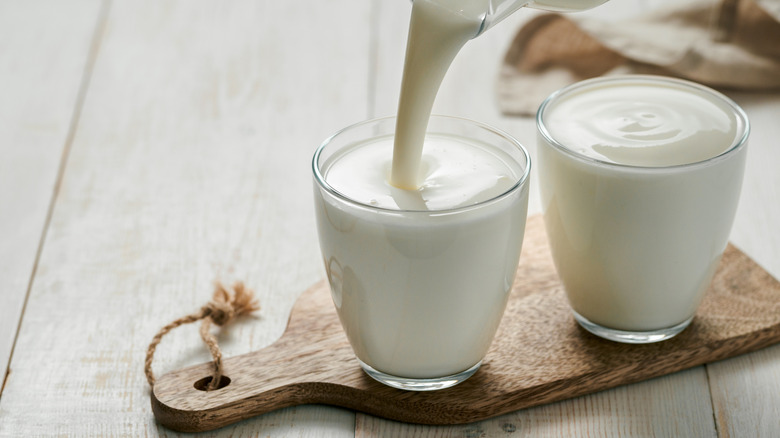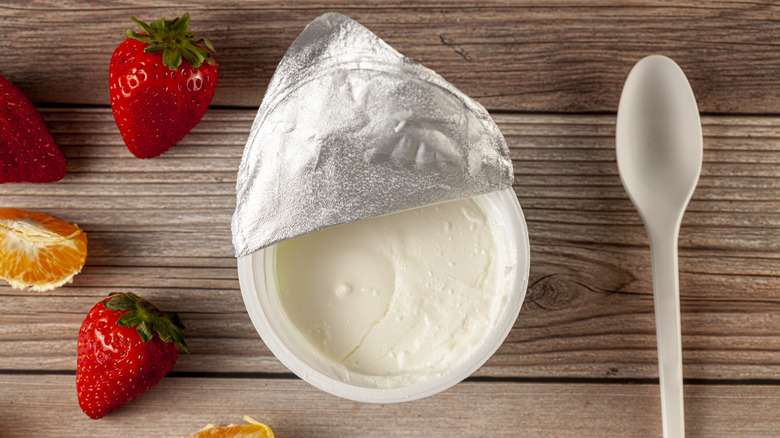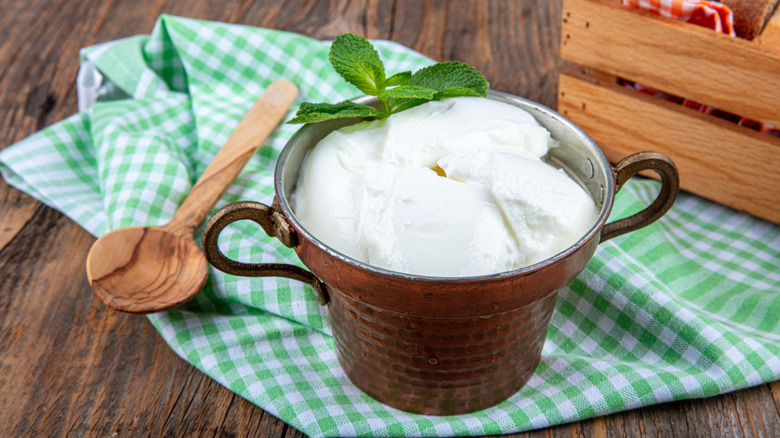Most Of The World's Yogurt Comes From This Country
You might be familiar with quite a few yogurt products whether you enjoy Go-gurt, Greek yogurt, or maybe you prefer frozen yogurt to ice cream! However you like it, you know that it's one of those rare and wonderful foods that can be eaten for breakfast, lunch, dinner, or dessert, and almost no one will bat an eye. Yogurt is enjoyed all around the globe. From India to Alaska and Denmark to South Africa you'll find yogurt products gracing the shelves of nearly every well-stocked store in the world.
According to research on the history of yogurt consumption published in Nutrition Review in 2015, lactic acid bacteria have a load of bodily benefits and have been wholly regarded as an excellent source of nutrition since 6000 BC! Today, yogurt is still highly regarded for its ability to keep us full and well-nourished, but no region indulges in yogurt as much as the Arabian Peninsula.
Yogurt in Saudi Arabia
According to the United Nations Food and Agriculture Organization's records from 2019, Saudi Arabia was responsible for producing 193,542 tonnes of yogurt, making it the global leader for the particular dairy product. The runner-up was Mongolia, but it only produced 39,360 tonnes in comparison. Atlas Big claims that alone, Saudi Arabia produces more than 70% of the world's yogurt, and The Science Agriculture says that most of their product is exported to other Arabian countries such as Kuwait, Jordan, Oman, and Bahrain, making yogurt one of Saudi Arabia's major export commodities!
Meiji reports that in Saudi Arabia, grazing livestock has been a massive part of people's livelihoods for thousands of years. Animals such as sheep, goats, and camels have been used as a resource for both meat and dairy products, including yogurt. The main yogurt products made in the Middle Eastern country are a yogurt-based drink called laban, a fermented yogurt called zabady, and a condensed yogurt called labni. There are several other yogurt-based foods and additives popular in Saudi Arabia and surrounding countries. Over the last few years, Saudi Arabia has seen a significant increase in domestic yogurt demand due to citizens incorporating dairy into their daily diets and this has allowed the market to grow (via TechSci Research).
What is yogurt exactly?
Yogurt is probably not a huge mystery to most of our readers. Honestly, it is quite easy to find in grocery stores and gracing breakfast tables and dessert bowls around the world. Yet, when most people when digging into their favorite yogurt parfait they don't necessarily contemplate the fact that the food they are eating is ancient, let alone a traditional and highly revered dairy product.
According to Arab News, yogurt is created through the process of fermenting milk, whether it be goat, cow, or sheep milk. For most of history, plain yogurt has been produced as a healthy dish widely regarded for its health benefits (aiding in digestion and bone support) throughout all corners of Asia for generations. Unfortunately today, many mass-produced yogurts are full of additives that negate some of the yogurt's natural benefits such as sugars and preservatives, but plain yogurt made from high-quality milk is still fantastic for the body.
There are many different kinds of yogurt to choose from including Greek yogurt, low-fat yogurt, drinking yogurt, and even frozen yogurt, but essentially, Yogurtini Nutrition says that they are all made from raw milk which goes through a pasteurization process as well as homogenization until it is ready to be fermented. After fermentation, yogurt is ready to be devoured with whatever sweet or savory ingredients your heart desires.
The history of yogurt
As we said above, people have been in love with yogurt for a long time. Depending on what part of the world you reside in, you might be more familiar with one kind of yogurt (usually a result of different animals and their milk being more prevalent in different parts of the world) over the other, but, at the end of the day, we all have the same mutual obsession our ancestors had.
Britannica explains that the art of yogurt making might have developed in the region we now regard as modern-day Turkey. Culture of Arab Food says that yogurt began to appear (possibly discovered by accident) around 10,000 – 5,000 BC, and we've been indulging in the creamy goodness ever since! According to the Longley Farm, yogurt has even been a fan-favorite of many larger-than-life historical figures including Pliny the Elder and Genghis Khan. Yogurt was even mentioned in the ancient Indian Ayruvedic scripts due to its advantageous health benefits. The point is that yogurt has been around for as long as we can remember and is loved now just as much, if not more than it was back then!



